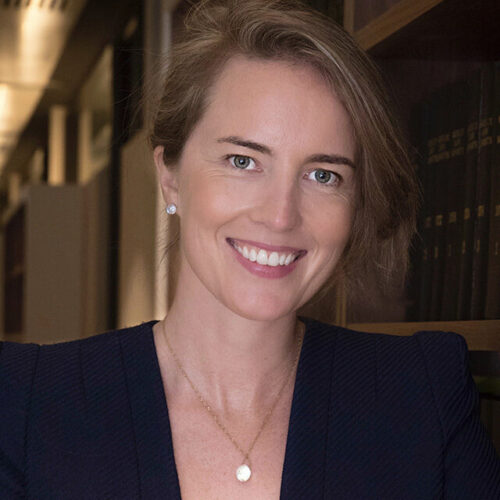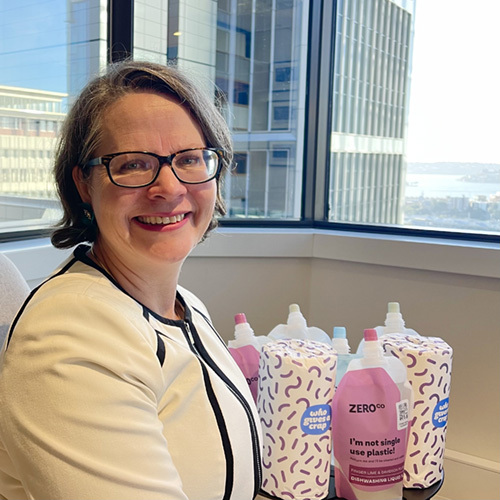- Winter 2023
- Greener Chambers

Is there a way to promote greener chambers? Talitha Fishburn spoke with several of Sydney’s clerks about environmentally friendly ways to operate chambers.
Nigel Bowen Chambers is committed to following environmentally sustainable practices and reducing its carbon footprint. It uses a 100% green electricity supplier. It also switched lighting to LED to reduce energy consumption. Alistair Coyne, Senior Managing Clerk, states, ‘We investigated if the building could use solar panels but unfortunately the roof space was not large enough due to the air conditioning units.’ Room sharing is available to maximise space usage. The floor stores ‘keep cups’ for takeaway beverages. In addition to using copier paper which is 100% recycled and Australian made, the chambers is in the process of upskilling barristers and staff with technology to encourage greater use of digital briefs and reduce the volume of paper in chambers. All printer cartridges are recycled by PlanetArk, a company that aims to make a difference to the natural world through positive environmental actions.
Level 22 Chambers actively turns its mind to green practice and supports a general view of reducing the carbon footprint. It uses sustainably sourced products (e.g., cleaning products for the kitchen/amenities). It prioritises supporting businesses that are aligned with good environmental standing. For example, it purchases paper products (e.g., tissues, toilet paper, paper towels) from a company named ‘Who Gives a Crap’, which uses 100% recycled paper and commits to giving 50% of profits to support access to clean water across the world. It’s no ordinary issue; contaminated water contributes to over 1 million deaths per year. Level 22 also uses Zero Co cleaning products, a company whose mission is to ‘Untrash the Planet’. For example, by the end of 2023, that business aims to stop 3 million water bottles worth of plastic going to landfill and 5 million water bottles from the ocean. Recently the chambers changed electricity provider to a green provider. The floor sources fresh fruit from Good and Fugly, a local produce supplier that diverts produce from being discarded. Jackie Charles, Clerk of Chambers, notes, ‘We encourage recycling by having separate recycling bins in several areas throughout the floor’. Ms Charles also observes that there is an increasing trend for barristers to adapt to digital practice, for example, e-briefs and online court books.

Martin Place Chambers moved premises in 2014. Michele Kearns, Clerk, states that many items from the old fitout were recycled, for example, directory boards and reception furniture. In fact, even some of Ms Kearns’ glass clerk’s office fitout was salvaged. She said, ‘We recycled where possible, we even wheeled the fridge across the road’. Sustainability was front of mind when they relocated. This included requesting the building to implement recycling systems, none of which then existed. Nowadays, she adds, ‘Every barrister has a recycling bin, and the kitchen has a composting system’. Typically, at the conclusion of a matter, paper briefs are shredded, and folders are returned to smaller city firms and law stationers to recycle. The chambers uses 100% recycled paper in the copier machines. It updates machines regularly in line with more energy efficient systems. Ms Kearns observes that up to 80% of briefs are now electronic such that the DX address is no longer maintained. The chambers also aims to avoid single-use plastics. Keep cups are available to avoid takeaway cups and lids.
Banco Chambers moved premises in 2019. At the time, it commissioned a durability study to ensure that its fitout design could last for as long as the long-term lease. The manufactured items in its new fitout were warehouse-stored to ensure that the curing process (e.g., the settling of industrial glues) occurred in a controlled factory environment. It sourced carpet tiles for highly trafficable areas, so that only portions of carpet tiles would need to be replaced over time rather than the entire carpet. Jeh Coutinho, Clerk, recalls that the chambers recycled some of the fitout waste products (e.g., excess stone) and repurposed it into door handles. It did not retain its previous fitout (which was 20 years old) but the chambers gifted items such as fridges from the old floor to a charity. Mr Coutinho observes that encouraging technical literacy is a key driver in a ‘greener’ chambers. It correlates with a reduction in paper. Each year, he notes, ‘The chambers hosts an in-house technology CPD to keep the barristers and staff up to date with new digital trends. This includes awareness on how to prolong the life of a device. For example, downloading security patches to avoid computers slowing due to viruses and therefore maximising the life of the computer.’ Other initiatives include storing left-over food from floor lunches for later consumption. Waste is separated into general, organic, and recycling waste in order to reduce landfill. Electronic waste is also set aside separately to be recycled. Printing defaults to double-side but the majority of the barristers use electronic briefing. The majority of its members use eBooks instead of hard copy books.
Black Chambers supports room sharing with a majority of its barristers sharing rooms in its Sydney premises at 185 Elizabeth Street. While the building does not have bike storage facilities, the chambers is in the process of installing bike hangers to accommodate the growing trend of cycling barristers. Vicky Johnston, Clerk, notes, ‘It’s the little things that add up. We display dried native arrangements and living plants rather than regular fresh flowers in reception. Our printers are set to default double-sided printing. We actively encourage junior staff members to take green initiatives.’ The chambers also supports recycling by using second hand items such as glassware and plates. Forbes Chambers occupies three floors in the same building at 185 Elizabeth Street. Ryan Coleiro, Clerk, states that energy efficient lights have been installed as well as motion sensors and air-conditioning timers to reduce energy consumption. Forbes also aims to select eco-friendly consumables where possible (e.g., recycled copy paper, Who Gives a Crap paper supplies and Blueland soaps). The chambers provides collection boxes that encourage barristers and staff to recycle paper, toner cartridges, batteries and lightbulbs. It also arranges regular recycling of electronic equipment. Similarly, Frederick Jordan Chambers offers recycling of computer and electrical equipment including batteries and ink cartridges. Gary Rootsey, Clerk, states that the chambers is in the process of transitioning to LED lighting which is more efficient.
8 Wentworth Chambers has introduced reusable water bottles for barristers to take to court. They are also plumbing in a mineral water tap to avoid single use bottled mineral water. They store keep cups for all floor members to avoid disposable cups. They recycle coffee pods with Nespresso. Carla Wilson, Clerk, observes that power settings have been modified to minimise waste. For example, the air-conditioning system is timed to stop at 6pm and does not operate on weekends. BN
Green Tips
• Appoint a ‘green’ officer to keep abreast of developing sustainability initiatives
• Store keep cups and reusable bottles to eliminate single use cups and bottles
• Use recycled paper
• Purchase environmentally sourced foods / coffees
• Optimise natural light
• Change printer default settings to double-sided
• Source products from sustainable companies (e.g., Who Gives A Crap)
• Provide digital subscriptions in lieu of hardcopy subscriptions
• Set up a bike rack or bike storage facilities
• Provide multiple recycling options (paper, electronic, composting)
• Use a green energy provider
• Install LED lights
• Use energy efficient appliances (e.g., fridges, dishwashers)
• Support local fruit growers
• Store leftovers
• Provide more sustainable food (e.g., less meat, organic)
• Provide education on digital / paperless strategies
• Offer room sharing
• Use fresh growing plants
• Donate or recycle old electronics
• Use compostable bags in the kitchen
• Use eco friendly cleaning products
• Provide education (e.g., on digital / paperless practice)
• Set reduction targets
